Essential Finch Care: Diet, Habitat, and Health Tips
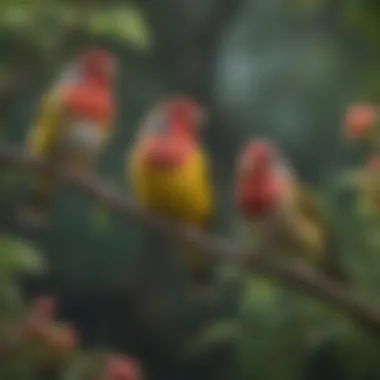
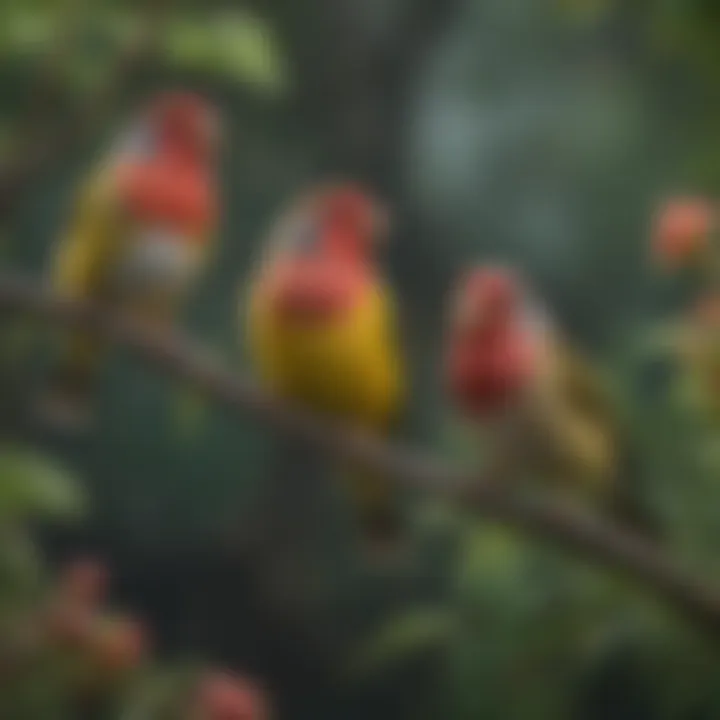
Intro
Caring for finches, those lively little creatures that bring a splash of color and song to our lives, is not just about providing food and water. It requires a thoughtful approach to their diet, environment, and overall health. As pet bird owners, understanding their specific needs is crucial to fostering a thriving atmosphere for these avian companions. A deep dive into their care will illuminate essential considerations that every owner should keep in mind.
A proper setup is like building a safe fortress for these delicate beings; it protects and nurtures them. So, what can an aspiring finch owner expect to learn? This guide will uncover the vital aspects of finch care: satisfying their dietary cravings, crafting the perfect habitat, observing health indicators, and maintaining their emotional well-being.
Whether you are just beginning your journey into the world of finch ownership or are looking to refine your current practices, this article serves as a treasure trove of insights. Let's embark on this journey together, ensuring our feathered friends receive the best care possible!
Understanding Finches
Understanding finches is not merely a preliminary requirement; it is essential for any aspiring bird owner or seasoned enthusiast who wishes to provide the best possible care for these lively creatures. The more you know about their specific needs and habits, the better you can cater to their happiness and health. Finches may seem like simple birds at first glance, but they possess layers of behavior, family dynamics, and nutritional requirements that are critical to their well-being.
By comprehending the basic needs and characteristics of finches, one can create a harmonious environment that promotes their well-being. For instance, recognizing their social nature can influence decisions on grouping birds together, leading to a more vibrant and interactive setup. Additionally, understanding their dietary preferences and behaviors can make a significant difference in how you approach their feeding habits, ensuring they receive a balanced diet.
Moreover, finches thrive under proper habitat conditions—including the right type of cage, suitable companions, and environmental enrichment. This knowledge not only maximizes their potential for growth and joy, but it also enhances the bond shared between finches and their caregivers.
"Knowledge is the bridge between domestic care and wild instincts—understanding finches is key to nurturing their spirit."
Species Overview
Finches encompass a diverse group of birds, characterized by their joyful chirps and vibrant colors. There are many species to explore, such as the popular zebra finch, the striking society finch, and the colorful Gouldian finch. Each species boasts its unique traits, which influence their needs and care requirements. For instance, zebra finches are often regarded as social butterflies, thriving in pairs or groups, while the elusive Bengalese finch exhibits a more laid-back demeanor, making them suitable for quieter settings.
When selecting a finch, consider both their personality and social needs. Researching various species can help you make informed decisions that resonate with your lifestyle.
Behavioral Characteristics
Finches are vibrant little creatures with personalities that sparkle. Their behaviors often reflect their social nature, which means they generally enjoy being around their kind. Observing them interact—pecking, singing, or even grooming one another—brings a degree of joy that is hard to quantify. Social dynamics play a key role in determining their happiness. A finch that is kept isolated may end up feeling stressed or even depressed.
Furthermore, understanding their vocalizations can offer insight into their emotional states. The way finches communicate can vary between species and even among individuals. They might sing sweet melodies when they are happy or engage in rapid chattering when feeling nervous.
Here are a few behavioral traits to know about finches:
- Social Interaction: They prefer to live in groups, creating a community dynamic.
- Curiosity: Finches are naturally inquisitive and need stimulation to remain engaged.
- Nesting Habits: Certain species enjoy building nests, which can be encouraged by providing nesting materials.
By grasping these behavioral characteristics, you not only foster a better environment for your finches but also deepen your understanding of their world, ultimately leading to a happier, healthier flock.
Essential Nutrition for Finches
Adequate nutrition is a cornerstone of finch care, influencing both their overall health and longevity. Finches, like any living creature, thrive on a balanced diet. This not only encompasses the types of food they eat but also how those foods interact with their unique physiology. A careful selection of their sustenance can lead directly to vibrant feathering, energetic behavior, and a robust immune system. Understanding the nutritional needs of these small birds is crucial for any owner committed to their well-being.
Balanced Diet Requirements
The foundation of a finch's diet should include a variety of nutrients. Generally, finches require a mix of carbohydrates, proteins, fats, vitamins, and minerals. Here’s a breakdown:
- Seeds: Common staples such as millet, canary seed, and flaxseed. However, not all seeds are created equal—some are high in fats, while others provide essential proteins.
- Fresh Fruits and Veggies: Finches benefit from the crunch and hydration provided by fresh foods like apples, carrot, and leafy greens. Just be sure to wash and chop these into manageable bits.
- Protein Sources: Uncooked eggs, cooked beans, and specialized finch pellets can offer crucial proteins. These are especially important during breeding months or for growing chicks.
It’s vital to not just rely on a single food type but to provide a blend, ensuring that finches do not miss out on any key nutrients. A varied diet mimics their natural foraging behavior, encouraging mental and physical stimulation as they explore their food.
Seeds vs. Pellets
The debate between seeds and pellets often stirs quite the conversation among avian enthusiasts. Seeds are frequently favored by both finches and their owners due to their natural appeal and variety. However, seeds alone might not provide the balanced nutrition necessary for optimum health. Some finches develop preferences that lead them to pick out their favorite seeds, often disregarding others that may be more beneficial.
On the flip side, pellets aim to solve this issue by providing a nutritionally complete option. Many brands offer pelleted food tailored to finches, boasting an array of essential vitamins, minerals, and proteins in every bite. The challenge often lies in convincing finches to accept these pellets—introducing them gradually alongside seed mixes can help ease the transition.
Nutritional Supplements
To further enhance a finch's diet, consider incorporating nutritional supplements. This might be especially relevant if the bird shows signs of distress or illness or during seasonal changes when dietary needs fluctuate. Common supplements include:
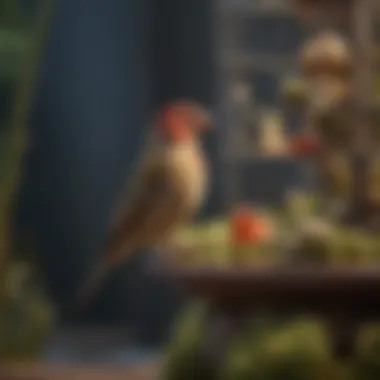
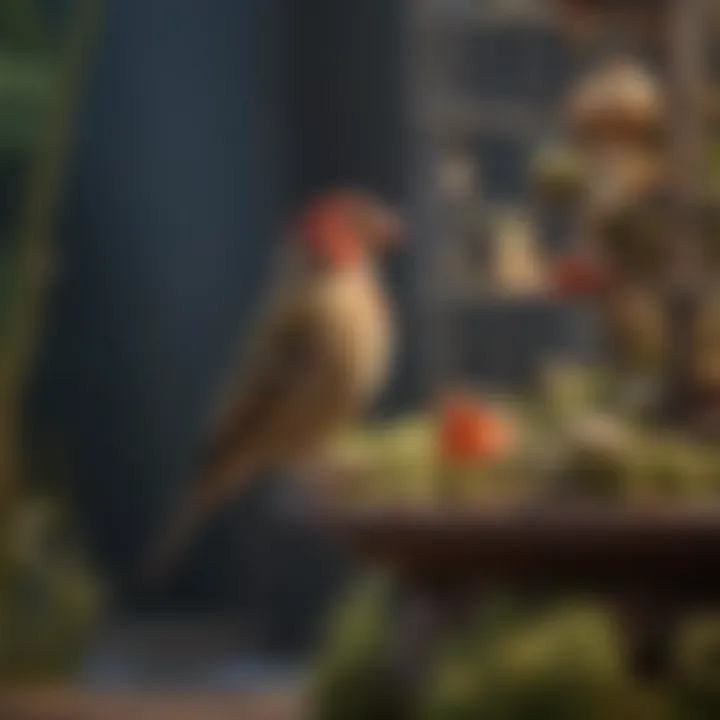
- Calcium: Crucial for bone health and reproductive performance. Products like cuttlebone or calcium blocks can be added to their cages.
- Multivitamins: These can help fill in any gaps a finch's diet may have, especially if you notice your bird is growing lethargic or disinterested in food.
- Probiotics: These beneficial bacteria can aid in digestion and overall gut health, which is particularly helpful during transitions between diets.
Always remember, a well-fed finch is likely a happy finch!
For more detailed reading, consider exploring resources like Wikipedia or Britannica regarding diets and health insights.
Creating the Ideal Habitat
Creating an ideal habitat is paramount for the well-being of pet finches. The right environment not only provides safety but also promotes natural behaviors and enhances overall health. A well-designed habitat encourages activity, offers opportunities for mental stimulation, and reduces stress, which is crucial for a species that thrives in lively social groups. This section explores key elements that help in forming a nurturing space for these delightful birds.
Cage Selection
When it comes to cage selection, size matters more than you might think. A cramped cage can lead to health issues and behavioral problems. Finches are highly active creatures, requiring ample space for flying and exercising. Ideally, the cage should be at least 30 inches long for a small group of finches, but longer is always better. The width should allow for side-to-side flying, so aim for a minimum width of 18 inches.
Material is another consideration. Stainless steel cages are durable and easier to clean compared to painted or plastic variants. Avoid cages with galvanized metal as it can leach harmful substances. Opt for horizontal bars, allowing finches to climb easily. To make the habitat feel more like home, include various perches of differing diameters and textures. This not only promotes foot health but also offers them spots to rest.
Environmental Enrichment
Environmental enrichment plays a vital role in fostering a fulfilling life for finches. Imagine being cooped up in a plain cage all day—pretty dull, right? To prevent boredom, provide opportunities for exploration and interaction within their habitat. Here are some effective ways to liven up their living space:
- Variety of Toys: Different textures, sounds, and movements in toys will capture their attention. Swinging toys, for example, can mimic natural movements they would experience in the wild. Add a few ropes for climbing and shredding, and watch their curiosity at play.
- Natural Elements: Incorporating branches from non-toxic trees or shrubs can create a more stimulating environment. It allows finches to engage with their surroundings and also promotes foraging behavior.
- Foraging Opportunities: Hide seeds or treats in foraging toys or scatter them around the cage. This encourages finches to hunt for their food, mimicking natural behaviors.
By providing this variety, not only will you keep your finches entertained, but you'll also contribute to their mental health and overall happiness.
Temperature and Humidity Control
The right temperature and humidity levels in the habitat are crucial. Finches thrive in temperatures between 65°F to 75°F (18°C to 24°C) and need to be shielded from drastic temperature fluctuations. Ensure the cage is placed away from drafts and direct sunlight, which can cause overheating.
Humidity plays a role too; maintaining an ideal humidity of 40-60% helps support their respiratory health. Too dry or too humid conditions can lead to various health complications.
You can achieve this by utilizing a hygrometer to monitor humidity levels. If your home is dry, placing a shallow dish of water near the cage or incorporating a humidifier can help. On the flip side, if it’s too humid, ensuring good ventilation and perhaps utilizing a fan can maintain a balanced environment.
"A well-maintained habitat not only enhances the life quality of finches but also fosters a deeply enriching experience for their owners."
Health and Wellness of Finches
When it comes to the well-being of finches, understanding health and wellness is paramount. Just like any other pet, finches require attentive care and regular checks to ensure they thrive in their environment. A healthy finch is an active finch—full of life, singing, and interacting with its surroundings. Taking the necessary steps to maintain their health leads to a happier bird and can significantly extend its lifespan.
Common Health Issues
Finches can be prone to several health conditions that can affect their vibrant lifestyles. Among the most common concerns are:
- Respiratory Issues: Symptoms often include coughing, sneezing, or wheezing. These can sometimes be triggered by drafts or poor air quality.
- Obesity: Overweight finches can face numerous health risks. A diet too rich in seeds and lack of exercise leads to this issue.
- Feather Plucking: This behavior often stems from stress, boredom, or health problems. It’s important to address any underlying causes quickly.
Being vigilant about these potential health issues will help owners catch problems early, allowing for timely interventions.
Signs of Illness
Recognizing the signs of illness in finches can sometimes be nuanced, especially since birds often hide their discomfort. Key indicators that may signal trouble include:
- Change in Behavior: Increased lethargy, aggression, or isolation from other birds may indicate illness.
- Physical Changes: Observe for changes in plumage, droppings, and weight. A dull or ruffled appearance can signal health problems.
- Vocalizations: A sudden change in singing—either a decrease or a different tone—can hint at illness or distress.
Regular observation and familiarity with your finch's normal behavior will make spotting these signs easier.
Routine Veterinary Care
Just like humans, finches benefit from routine check-ups. Although visits might not be as frequent, they are critical in monitoring the bird’s health. Tips for effective veterinary care include:
- Finding an Avian Veterinarian: Not all vets treat birds. Look for someone specializing in avian care to ensure your finch receives the best attention.
- Regular Check-Ups: Annual visits help catch any issues before they become serious. These check-ups typically include weight assessments and general health evaluations.
- Vaccinations and Treatments: Ensure your finch is up-to-date on any necessary vaccinations or treatments that will safeguard its health.
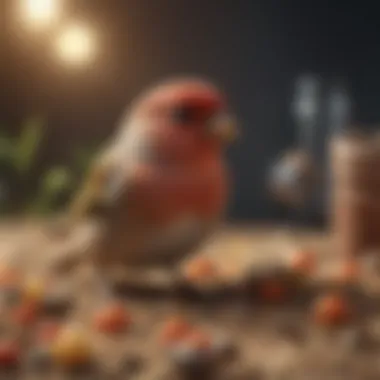

Preventive Health Measures
Preventive care is essential for maintaining the overall health of finches. Here are some practical strategies to incorporate into their daily routine:
- Maintain Cleanliness: Regularly clean the cage, perches, and food containers to reduce the risk of infections and illness.
- Balanced Diet: Ensure a varied and nutritious diet to support their health. This includes seeds, fresh fruits, and vegetables.
- Safe Environment: Provide a safe space free of potential hazards. This includes avoiding exposure to toxic plants or harmful substances, such as smoke from cooking.
"Healthy finches are more than just happy pets. They are engaged, curious, and bring endless joy to your life."
By focusing on these health and wellness aspects, finch owners can establish a strong foundation that nurtures a thriving and vibrant life for their beloved birds.
Social Dynamics of Finches
Understanding the social dynamics of finches is vital for creating an enriching and balanced environment for these vibrant birds. Finches are inherently social creatures; they thrive on interaction and display complex behaviors within their communities. The relationships and hierarchies that establish themselves within a flock create a healthy environment. Owners need to recognize the need for social companionship among finches to ensure their well-being.
Understanding Finch Behavior
Finches exhibit a fascinating array of behaviors that reflect their social nature. They communicate through chirps, trills, and body language. Observing these interactions can provide insights into their emotional states. For instance, finches that puff up their feathers may be asserting dominance or expressing confidence. In contrast, closed feathers might suggest fear or submission. It’s crucial to give them opportunities to socialize, like providing perches where they can interact freely. Including mirrors in their habitat can also encourage engagement, especially for single finches, as they often respond positively to their own reflection.
Keeping Multiple Finches
When it comes to housing finches, keeping multiple birds is generally recommended. Birds of the same species or compatible species often develop strong bonds. A few considerations include:
- Space: Each finch needs adequate room to avoid territorial disputes. An overcrowded cage can lead to stress and aggression.
- Diversity: Mixing species can offer richer social experiences as long as the species are known to cohabitate peacefully. Some finches such as zebras and society finches get along harmoniously.
- Observation: Monitoring interactions provides crucial insight into group dynamics; signs of bullying or exclusion warrant intervention.
Integrating Finches with Other Birds
Integrating finches with other bird species can be tricky and requires careful planning. Here are some tips:
- Compatibility: Choose species that share similar temperaments and sizes, as larger, more aggressive birds can intimidate or harm smaller finches.
- Supervision: Initial introductions should happen in a neutral space and under supervision to prevent any sudden territorial aggression.
- Separate spaces: Each species should have separate feeding areas. This helps to reduce competition for food and space.
By being conscious of finch social dynamics and providing suitable environments, owners can promote healthier, happier birds. After all, fostering these social interactions enhances their quality of life and might even lead to delightful surprises as they engage in the delightful chaos of finch society.
"A happy finch is a singing finch, and most happy finches are those that can enjoy companionship."
Proper attention to these social needs ultimately cultivates a thriving and harmonious environment.
Exercise and Mental Stimulation
When it comes to finches, just like with any living creature, exercise and mental stimulation play critical roles in their overall health and well-being. These lively birds are naturally active, and when they lack proper outlets for their energy, they can develop a host of issues, both physical and behavioral.
Keeping finches engaged and active isn’t just about having them flit about in their cage; it’s about creating an environment that promotes both physical movement and mental engagement. Incorporating opportunities for exercise and mental challenges can lead to a happier, healthier bird, which is ultimately what every finch owner wants.
Importance of Activity
Physical activity is essential for finches as it helps prevent health issues like obesity and cardiovascular problems. Just imagine a pet that didn’t get enough movement; it would lead to stiffness and even ailments in their joints. Finches, being naturally energetic, need to stretch their wings and hop around regularly.
- Burning Off Energy: Regular exercise helps them release pent-up energy and avoid boredom-induced behaviors such as feather plucking or excessive screeching.
- Social Interaction: Activity often includes interaction with other finches, fostering social bonds which are vital for their mental well-being.
- Weight Management: Just like humans, finches need to maintain a healthy weight. Activity helps keep their weight in check.
“A healthy bird is a happy bird, and keeping them active is the key!”
Toys and Interactive Play
Introducing toys and interactive play into your finch’s environment can vastly improve their mental stimulation. It’s crucial to choose the right types of toys and activities that not only engage their curiosity but also encourage physical movement. A few thoughtful ideas include:
- Perches of Different Shapes and Textures: Providing a variety encourages them to climb and move in different ways, as finches love to explore all areas of their space.
- Foraging Toys: Such toys can be filled with seeds or treats, allowing finches to forage, which mimics their natural behavior in the wild.
- Swings and Ladders: These encourage swinging and climbing, giving them plenty of activity options and variety in their daily routines.
- Mirrors: Birds often enjoy interacting with their reflection, which provides both entertainment and mental engagement.
Creating an engaging environment with these tools not only contributes to physical health but also to their overall happiness. It’s a simple investment that goes a long way in fostering joyful finch companions.
By keeping activity levels high and ensuring your birds have plentiful engaging materials, you’re helping them develop into well-rounded, happy pets. The balance between exercise and mental stimulation is indeed delicate, but when given the right focus, it is achievable.
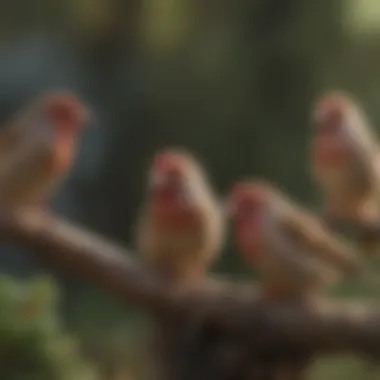
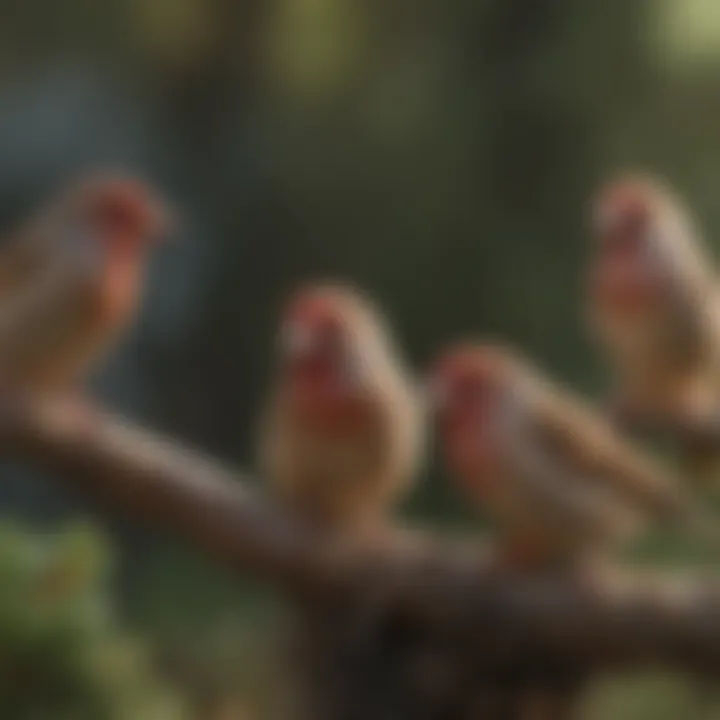
Behavioral Training Techniques
Training finches might not come to mind as the first step in pet ownership, but it plays a critical role in their overall happiness and health. Just like humans, finches like to have structure and can benefit greatly from learning new behaviors. Training fosters a bond between you and your finch, and it can even improve their emotional well-being. While the idea of training birds may sound daunting, it is a journey filled with patience and understanding.
Positive Reinforcement
One of the cornerstones in any animal training method is positive reinforcement. This approach is rooted in the principle that rewards will encourage a desired behavior. For finches, these rewards could be tasty treats, praise, or gentle strokes—whatever makes them chirp with joy.
Generally, it’s best to start with a simple command. For example, teaching your finch to step onto your finger can create a platform for more advanced training later on.
- Use Favorable Treats: Find out what treats your finch enjoys most. Some may relish millet, while others might prefer tiny pieces of fruit.
- Start Small: Begin with short sessions to avoid overwhelming your feathered friend.
- Timing is Key: Reward them immediately after they perform the desired action. This builds a clear association between the behavior and the treat.
“Training is not just about teaching tricks; it’s about communication and building a bond.”
Once your finch starts to respond positively, gradually introduce new commands or tricks. Be prepared for hiccups along the way; every finch has its own pace and personality.
Basic Commands and Tricks
Teaching your finch basic commands can lead to a more enjoyable interaction. Commands like "come" or "stay" can help manage their behavior and create a routine that both you and your bird can thrive in.
Besides commands, you might want to teach them fun tricks. These can include:
- Wave: Lifting one foot as if waving can be easily trained with the right cues.
- Turn Around: This trick involves encouraging your finch to turn in circles, which is not only entertaining but helps with coordination.
- Play Dead: For the more adventurous, train your finch to fall on its side when prompted. When introducing these commands, patience remains paramount. Some finches might take to learning like a duck to water, while others may require more time. Keep in mind that the consistency of your approach will reinforce their behavior. With practice, these birds can truly showcase their remarkable intelligence.
Finches and Their Lifespan
Understanding the lifespan of our feathered friends is crucial for every pet bird owner and aspiring bird parent. Knowing how long you can expect your finches to live helps in planning their care and ensuring you provide an environment that facilitates their longevity. When it comes to finches, their lifespan can vary greatly depending on numerous factors. Thus, it's essential to grasp both lifespan expectations and the various influences that may impact their lives.
Lifespan Expectations
In general, finches can live anywhere from five to fifteen years, depending on species and care conditions. Some popular species, like the Zebra Finch, typically live around 5 to 7 years, while others like the Society Finch can often reach lifespans of 10 to 15 years. Here’s a brief look at notable species and their expected lifespans:
- Zebra Finch: 5-7 years
- Society Finch: 10-15 years
- Gouldian Finch: 8-10 years
- Canary: 8-12 years
These numbers give a rough idea, but remember, they are not set in stone. Exceptional care can push these boundaries, while neglect or poor maintenance could shorten their lives significantly. Knowing what to expect can prepare you emotionally and practically for the journey ahead with your finch.
Influencing Factors
Several elements can influence the lifespan of finches, and being aware of these can help you provide the best care possible.
- Diet: A balanced and varied diet is fundamental for the health of finches. Quality seeds, pellets, fresh fruits, and vegetables can ensure their nutritional needs are met. Poor nutrition can lead to health problems that may shorten their lives.
- Living Environment: The habitat can make a world of difference. A spacious cage that allows for flight, safe perches, and enriching toys contributes to their mental and physical well-being. An overcrowded or unsuitable space can cause stress, leading to health issues.
- Social Interaction: Finches are social creatures. Keeping them alone often leads to loneliness and depression, reducing their lifespan. Pairing them with other finches or keeping compatible species enhances their quality of life.
- Veterinary Care: Regular check-ups and immediate attention to any signs of illness can nip problems in the bud. Neglecting veterinary care can lead to serious health issues that might shorten their lives.
- Stress Management: Changes in their environment, loud noise or threats from other pets can stress finches. Managing their exposure to stressors is key in promoting a longer life.
In summary, understanding how long finches can live, along with the factors that influence their lifespan, arms you with the knowledge to make educated decisions in their care. Taking a holistic approach that combines good nutrition, adequate space, social companionship, routine veterinary visits, and stress management ensures your finch days aren't just long, but filled with quality and happiness.
"The life of a finch might seem flighty, but with the right care, it can be as robust as a sturdy oak."
For further insights on finch care, you might explore resources like Wikipedia for general information or visit community platforms such as Reddit for real-life experiences from fellow finch owners.
Resources for Finch Owners
As a finch owner, you’ll quickly realize that having access to reliable resources can make all the difference in ensuring the well-being of your small feathery companions. This section explores the various types of information and networks available that aid in providing the best care for your finches. Being informed not only helps you create a happy environment for your birds but also equips you to tackle any challenges that may arise.
Recommended Reading
When it comes to understanding finches, books and articles can serve as goldmines of cherished wisdom. Here are a few must-read titles that provide valuable insights into finch care:
- "Finches: A Guide to the Most Popular Species" - This book covers a range of finch species, their traits, and specialized care needs, perfect for a novice or an experienced owner.
- "The Finch Handbook" - This guide dives deep into nutritional requirements and health problems, helping owners navigate the common issues that can arise.
- "Finches: Their Care and Breeding" - Focused on breeding and social behaviors, this book is fantastic for those looking to start with breeding finches.
These books, paired with magazine articles or online blogs, will keep you informed on the latest care techniques and scientific findings about finches. Don't overlook reliable websites like Wikipedia and Britannica for well-researched information.
Supportive Communities
Connecting with others who share your passion for finches can be incredibly insightful. Many befriend groups online or even local clubs provide a support system that is invaluable. Here are a couple of avenues to explore:
- Online Forums: Websites like Reddit have dedicated subreddits where enthusiasts share tips, success stories, and concerns related to finch care.
- Social Media Groups: Platforms like Facebook host numerous groups focused on finch care and ownership. These communities often share advice on topics from habitat setup to common health issues, enabling you to learn from various experiences.
Participating in these supportive circles allows you to engage with individuals who face similar challenges and triumphs, offering a sense of camaraderie. Learning from one another accelerates the journey to becoming an adept finch owner.
"Community knowledge often fills the gaps left by solitary research. Together, we learn and grow."
Through efficient gathering of knowledge and support, you can ensure a rich, fulfilling life for your finches, ultimately benefiting both you and your feathered friends.















